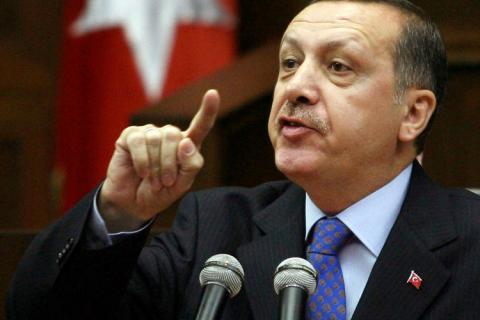
Turkey’s regional rivals aren’t so easily enthralled as the audience at the 2013 Children’s Day Festival, Incirlik Air Base, Turkey.
Diplomacy may be the art of telling people to go to hell in such a way that they ask for the directions, but in the Turkish case there are too many people whom the Turks are telling to go to hell and, more problematically, they do not seem to be asking for the directions. But Ankara is trying nonetheless.
As part of a new diplomatic offensive that will enable Turkey to become a regional leader inspired by a blend of neo-Ottoman and pan-Islamist ideologies, the Turkish Foreign Ministry will acquire 115 new office cars in 2015 (according to the 2015 draft budget bill). Fancy cars flashing their lights and speeding between various ministries can help build better policy coordination. Confusion can therefore be averted at every level.
One of the pages of our flagship newspaper, Hürriyet, ran a story on Oct. 16, quoting Prime Minister Ahmet Davutoğlu as telling Al-Jazeera that: “We have never used the term buffer zone [along Turkey’s border with Syria, or, more realistically, with the Islamic State of Iraq and the Levant – ISIL]. We have used the term safe haven.”
On the same page, a news story quoted Deputy Prime Minister Numan Kurtulmuş as saying, “We want a no-fly zone and a buffer zone.” Inevitably, one wonders what topics are discussed at Cabinet meetings in Ankara. If the honorable ministers do not have the habit of exchanging cooking recipes or enjoying backgammon tournaments, they must be debating subjects that are more important than the threat of ISIL.
The Turkish myopia fails to even see its own creation of the Frankenstein monster, as well as the future monsters it intends to create in order to kill the only monster it sees: Bashar al-Assad. Members of the press ought to be prepared for a Turkish prime minister (or president) who may soon start to blame global warming and water shortages on al-Assad. “We as the world’s major powers cannot seriously tackle starvation, corruption, piracy, drug abuse and unfair income distribution on our planet if we do not depose al-Assad.” Cue thunderous applause.
But Mr. Davutoğlu’s diplomatic enchantment fails to enchant even “our dear Muslim brothers.” The Turkish Foreign Ministry recently felt compelled to summon Iranian Ambassador to Turkey Alireza Bigdeli. Ironically, Ambassador Bigdeli is the same man who only a year ago had passionately praised Turkey’s rulers: “Just as Imam Khomeini did in Iran, the Justice and Development Party [AKP] has paved the way for the advancement of Islam in Turkey.”
Anyone who is not passionately pro-Hamas or pro-Muslim Brotherhood, or not their sponsors in this part of the world, is a foe or a potential foe of Messrs. Erdoğan and Davutoğlu.
Mr. Bigdeli was summoned because Ankara wanted to denounce recent remarks by Iranian officials. Iranian Deputy Foreign Minister Emir Abdullahyan recently accused Turkey of pursuing “neo-Ottomanist” policies in the region. And Iranian Chief of General Staff Hasan Firuzabadi, meanwhile, indirectly criticized Turkey for blocking aid to Kobane, a Kurdish town on Syria’s border with Turkey that has been attacked by ISIL.
Could that be the reflection of a sectarian rift? It could. But Egypt remains overwhelmingly Sunni. And a few weeks ago an influential group of Egyptian intellectuals, artists and political NGOs called for a boycott of Turkish products in response to what they describe as “unjustified attacks on Egypt by Turkish President Recep Tayyip Erdoğan.”
For instance, Samir Sabri, an Egyptian lawyer, recently filed a lawsuit to force the Egyptian government to ban the entry of Turkish products into the country. Gamal Anayet, a television anchor and writer, has also called for a boycott of Turkish products and has even encouraged Egyptians to drop Turkey as a tourist destination.
Sadly, anyone who is not passionately pro-Hamas or pro-Muslim Brotherhood, or not their sponsors in this part of the world, is a foe or a potential foe of Messrs. Erdoğan and Davutoğlu. And there are more than plenty of them.
**Burak Bekdil is a columnist for the Istanbul-based daily Hürriyet and a fellow at the Middle East Forum.




















